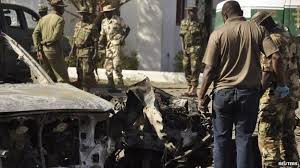A suicide bomber killed six people at a church in Potiskum, Yobe State, while twin explosions in Jos left about 16 persons dead.
while the Potiskum incident occured Sunday morning, the Jos explosions happened Sunday night at the end of a week in which suspected Boko Haram insurgents killed more than 200 people.
According to sources, the twin blasts occurred at a Tafsir (Muslim Ramadan preaching) venue around Yantaya, Nasarawa Gwon area, with another at Bauchi road, just before the University of Jos main campus.
Both explosions occurred in Jos North Local Government Area of the state.
The twin explosions occur hours after a suicide bomber killed at least six people in a church in Yobe State.
Though no official casualty figure has been released, but an eye witness said that no fewer than 16 bodies have been moved to Plateau General Hospital.
Reuters reports that the blast in Potiskum in Yobe state on Sunday came after an attack on the capital of neighbouring Borno state on Friday, deadly raids in three towns during the week and suicide bombings along a highway.
President Muhammadu Buhari said the murder of up to 150 Kukawa residents near Lake Chad on Wednesday by Boko Haram was a “heinous atrocity”. Several people who attended burials there, including a senior government official, said 147 bodies, including 22 children, had been interred.
Also last week in Borno, about 50 people were shot dead in nearby Monguno, 12 men were killed in a raid on Miringa and two suicide bombers killed another 10 alongside a highway.
The spate of bloodletting prompted renewed international outrage and French President Francois Hollande said he was ready to hold a summit with regional leaders to coordinate the fight against Boko Haram.
The Defence Ministry said six suicide bombers had blown themselves up during the attack on the outskirts of Maiduguri on Friday, killing a soldier and “scores” of civilians.
The army said it recovered a jeep packed with explosives after repulsing the attack.
New president Buhari vowed to crush Boko Haram when he was sworn in on May 29. But the insurgents have stepped up their attacks, despite losing huge chunks of territory this year to soldiers from Nigeria, Cameroon, Chad and Niger.
Buhari’s spokesman Femi Adesina said on Saturday that a multinational capability in place with the power to “devastate and decapitate” the insurgency would soon be set in motion.
Adesina said Buhari was poised to defeat the insurgency but the government would talk if Boko Haram came to the table.
“Most wars, however furious or vicious, often end around the negotiation table. So, if Boko Haram opts for negotiation, the government will not be averse to it,” he said.
Boko Haram’s stronghold of Borno state in Nigeria borders Cameroon, Chad and Niger and soldiers from all four countries have taken on the insurgents this year.
Buhari is due to visit his counterpart in Cameroon after the Muslim holy month of Ramadan and meets U.S. President Barack Obama on July 20, when Boko Haram will be high on the agenda.














